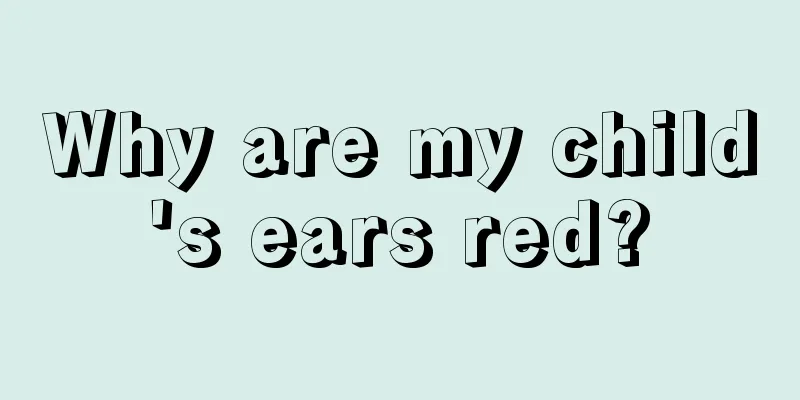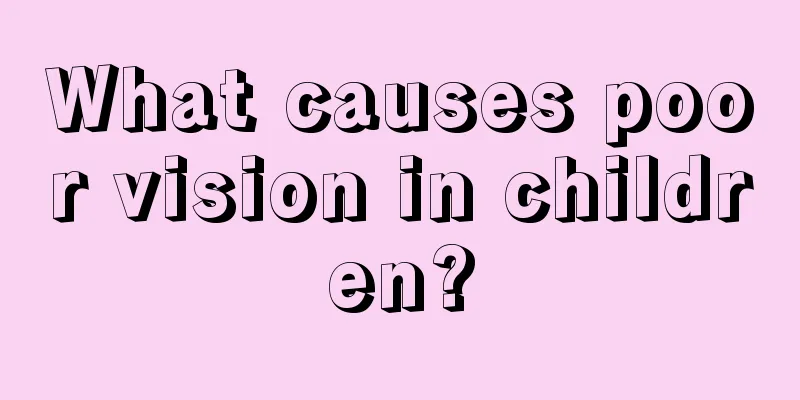Why does my baby have a fever? The reason is so complicated

|
Babies are very prone to high fevers, and the reasons are very complicated, such as environmental influences, wrong food, bacterial infection, etc. Many times parents don’t know the reasons, but they should at least know how to deal with fevers. 1. Non-disease factors: The baby's body temperature is easily affected by the external environment: high temperature (heatstroke), wearing too many clothes, insufficient water intake, water loss (sweating, diarrhea), poor ventilation in the room, before and after strenuous exercise, the effects of certain special drugs, and other factors such as preventive injections may also cause fever. If the body temperature becomes unstable, the possibility of illness should be considered. 2. Disease factors: (1) Fever in infants under 3 months old Bacterial infection is the most common (such as group B streptococcus); other infections such as respiratory tract, urinary tract, gastrointestinal tract or otitis media can also cause fever. The most serious infectious disease is sepsis. Therefore, when a newborn has a fever, it is important to take the baby to a doctor for examination so that early diagnosis and treatment can be given. (2) Fever in infants and young children older than 3 months The most common ones are colds, otitis media, and urinary tract infections. Otitis media is usually caused by bacteria or viruses from a cold infecting the middle ear through the Eustachian tube. Except for severe otitis media where pus can be seen flowing into the ear, most abnormalities cannot be seen from the outside. 3. The baby’s living environment is too clean. Some people may ask, is there anything wrong with being clean? There is nothing wrong with being clean, but you can't overdo anything. For example, some mothers use 84 disinfectant at home. They treat their baby's bottles and toys with 84 disinfectant, making the child's living environment almost sterile. This is not acceptable. Our living environment cannot be separated from bacteria, otherwise allergic diseases will increase accordingly, the child's immune system will be disordered, and when they leave the protection of their small family and come to kindergarten, they will be stimulated by a different environment and will have a runny nose and cough. This is actually allergic rhinitis and allergic cough caused by allergies, and has nothing to do with colds. |
<<: How to take care of your baby if he has a fever and sweats? These methods are very useful
>>: How to reduce baby’s fever? These methods are simple and effective
Recommend
The harm of tics to children's health
Children's physical health is an issue that p...
What to do if your child coughs at night
There are many factors that cause children to cou...
Reasons why babies have dark complexion
A baby's face turns dark, which is a kind of ...
What to eat when children have anorexia
Life is gradually improving, and the quality of l...
Newborn milking method
From ancient times to the present, our ancestors ...
Introduction to baby seborrheic dermatitis
Many friends may not know that seborrheic dermati...
What are the causes of enuresis in children? This is the truth!
There are many reasons for enuresis in children. ...
Can babies take zinc supplements? It is important to understand your baby's condition
Zinc is essential for everyone. If a baby lacks z...
Is it good for babies to sleep frequently?
Many mothers have found that newborn babies alway...
What causes baby sweating?
Many children are born with a weak constitution. ...
12-year-old baby education
In life, many parents feel particularly worried a...
Can children grow taller by jumping on the spot?
The height of today's teenagers generally sho...
How to make newborns fall asleep quickly
For some newborns, they spend most of their time ...
The main reason for baby's bone cracking
I believe every mother cares more about the baby&...
Treatment of low-grade fever in children
In our lives, it is common for children to have a...









